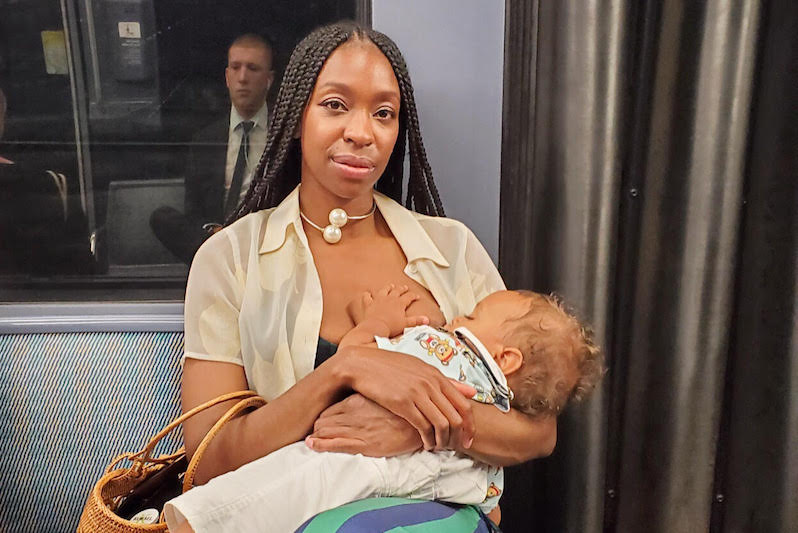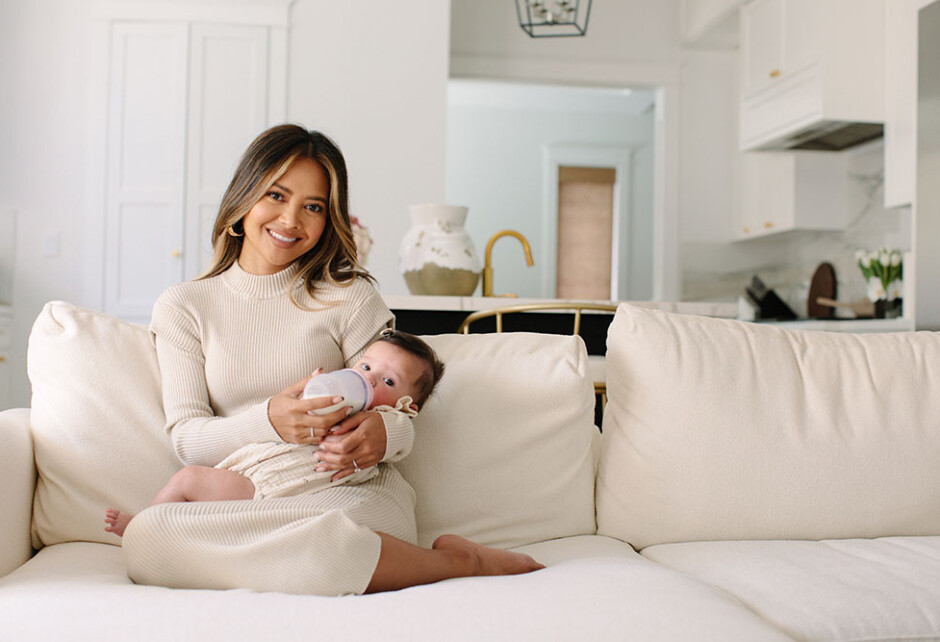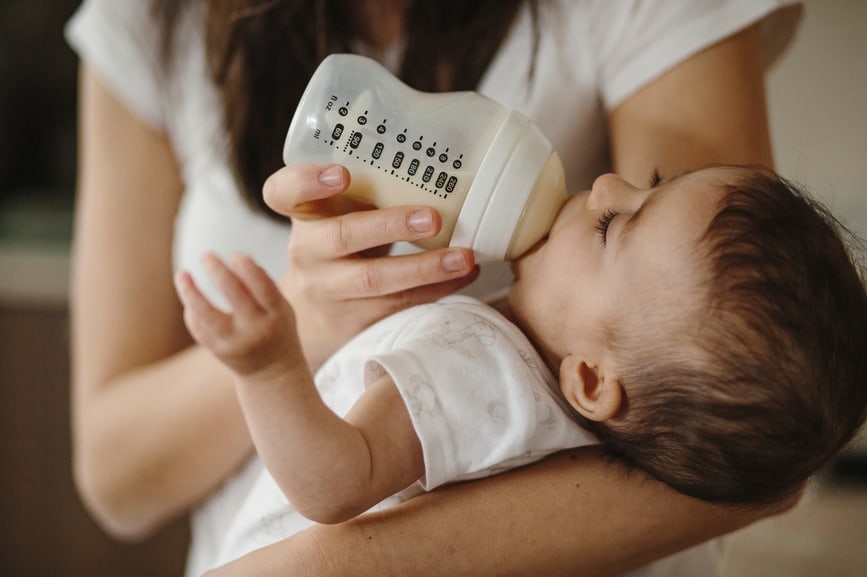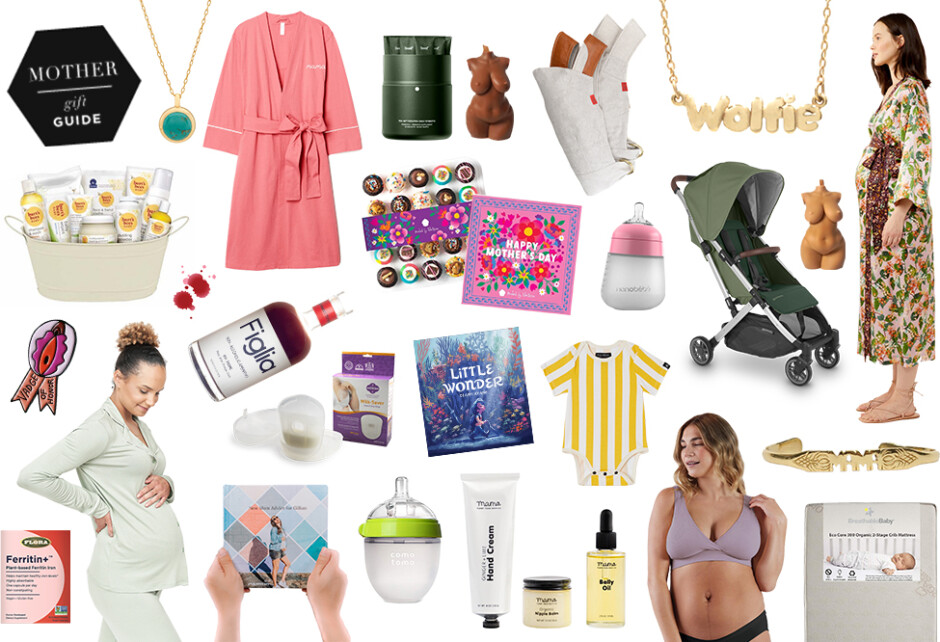
Mom Talk: What Mastitis Taught Me About Motherhood
Written by
Photography by
Photograph courtesy of Brittni Chicuata
As National Breastfeeding Month and Black Breastfeeding Week both come to a close, we thought this touching Mom Talk essay from Brittni Chicuata would be the perfect ending. Throughout this month, we’ve celebrated the beauty of breastfeeding, highlighted the importance of cultural- and community-specific support, and rounded up helpful tools for new breastfeeding mamas. But we wouldn’t be telling the full story if we didn’t also dig into the pain and challenges that can come along with it. Brittni was a brand-new mom determined to get motherhood right, but it wasn’t until she realized that her struggles with breastfeeding were shared with countless other women that she was able to reach out and get the help she needed. We are sure many mamas will relate deeply to Brittni’s story, and hopefully it will make them understand that they are not alone.
As I approach his first birthday, reflecting on the first weeks of my son’s life is a tender topic for me. I am reminded of the duality that I lived with day-by-day: at once feeling overcome by the excitement and pure joy of having my baby, yet at the same time, feeling completely knocked over and terrified by that newness. Remembering this point in time is like picking at a scab that gets tender the more you poke and prod away. I’m not over it; the fresh skin hasn’t fully healed. But it is this reaction that compels me to share my experience. This #BlackBreastfeedingWeek, I want to share what “normal” looked like for this new mommy. For me, learning how to breastfeed taught me a valuable lesson about personal strength and community.
The not-so-known reality is that breastfeeding is some real-life physical labor! And there are no shortcuts in this line of work. The term “trial by fire” has never been a more apt description for anything else I’ve worked on. By day two postpartum, I was engorged beyond description. My body would tense up, my shoulders hurt from crouching in these new, awkward positions, and I was legitimately afraid to feed my baby. I was afraid of the pain: my let down hurt, his latch hurt, and I was afraid of how long he’d eat. Feeding my son became a terrifying hourly event where I’d hold my breath and just try to make it through without passing out. My back was aching, my wrists hurt, and my breasts were on fire. They had turned a fire red tomato color, with my areola creeping up to my sternum/collarbone area. I used to refer to it as “labor of the titties” because I straight up felt like I was having contractions in my chest every time they started to tingle in anticipation of feeding or pumping time.
I was in constant, excruciating pain. I couldn’t stand the sensation of clothes touching my body. I was moody and dizzy. I could tell that my milk was backed up and would take long, hot showers to massage my breasts and try to get the milk to flow. My husband would help me with these horribly painful olive oil massages and hot towel compresses. I soaked in Epsom salt at odd hours of the night after each feeding. I tried all the holding positions to get a good latch (football, crossbody, dangle feeding). I downloaded multiple apps to track my feeding schedule. I looked up “tongue-tie” and “thrush” and “milk blebs” (which came later). Nothing I did to relieve that deep, deeeeeep pain worked for me. Additionally, my breasts were GIANT—like, the-size-of-my-kid big. I still couldn’t sort out what was “normal soreness” and what was something medical. I thought I just needed to push through. People (the advice nurse, a midwife friend, other mommies) told me that I had mastitis, or blocked milk ducts, but I was being stubborn about going to the doctor.
Before this point, I had been a “very prepared pregnant person” and thought I’d done everything right to prep for childbirth, asking ALL THE QUESTIONS during prenatal appointments, collecting enough information on #BlackMamasBirthing to write my own book, doing skin-to-skin right after baby was born, and breastfeeding pretty much immediately. I’d even consulted multiple midwives, doulas, and other parents about breastfeeding. Still, even the mamas who’d breastfed twins seemed to have less trouble, and I was really pissed that breastfeeding wasn’t more intuitive for me.
When breastfeeding didn’t come naturally, I suffered silently in shame and embarrassment. Friends would innocently ask, “How is it being a new mommy?!,” and I would respond “Incredible! Life changing!” What I really wanted to respond with was the music video for Doja Cat’s “Mooo!” song, because I straight up felt like a (way less sexy) cow. I felt like my only function was to be on-call to keep someone else alive with my body. And this was a huge knock to my formerly independent self. Plus, I did not want to admit that I sucked at it! Breastfeeding had been phoned to me as the only way to go (breast is best!) and things were not clicking.
Soon the electric, white-hot pain was coupled with chills and a fever. The last straw for me was sitting up one night, (loudly) crying salty tears into Baby’s face when he stopped in the dead silence of the night, looked up at me and straight up laughed. My two week old baby seemed tickled by my pain. I don’t know if you’ve ever had a moment in deep delirium where you’re feeling like you’re in a hole of hormones, night sweats, fatigue, and voracious hunger, and then your kid starts laughing at you, but that shit did not feel good.
At a certain point, I took a moment and remembered my pregnancy mantra: You are not special. I did not mean this in the sense that I am neither unique nor important, I intended it to mean that I am one of billions and billions of birthing people over the history of time, and nothing that I was experiencing could possibly be new. To me, my mantra was a reminder that there’s no possible relief or benefit to keeping your experiences to yourself. “Someone in the world has had these feelings today,” I thought. Someone in your network has shared in this pain and can guide you through your struggles or give you resources to help you figure out your best course of action.
And so, I started to speak up. I asked the mommies in my family and my friend groups for help. I went online all the time, looking at hashtag after hashtag, poured over mom blogs, seeking companionship and solidarity to normalize what I was going through. And thankfully, beyond my personal network, I was able to find a community of women online who were supportive when I needed them most and helped with resources when I didn’t have the strength, energy, or consciousness to find things on my own.
Once I found the words to speak up, it was both loved ones and strangers who offered me so many amazing resources, and talked without judgment or inhibition about the very new and disturbing things that my body was doing. They shared lactation consultants, advice, and simple verbal support. My virtual and real life community emboldened me not only to keep going with breastfeeding and figure out solutions to the very real physical pain that I was going through; they helped me be unapologetic about breastfeeding as I figured things out. I went to the doctor, got antibiotics and natural supplements, and adjusted my body to let baby lead our feeding sessions. With support, patience, and the guiding hands of my ancestors, I was able to make the best choices for myself and my child. I came out on the other side grateful for my perseverance and for the loving, amazing women who kept it real with me and gave me a boost over that steep learning curve.
Are you a mother with something to say? Send us an email to be considered for our “Mom Talk” column.
Write a Comment
Share this story





This is a testimony of the power and worthiness of womanhood, motherhood and community. It’s definitely here to help guide us and I’m grateful for that.